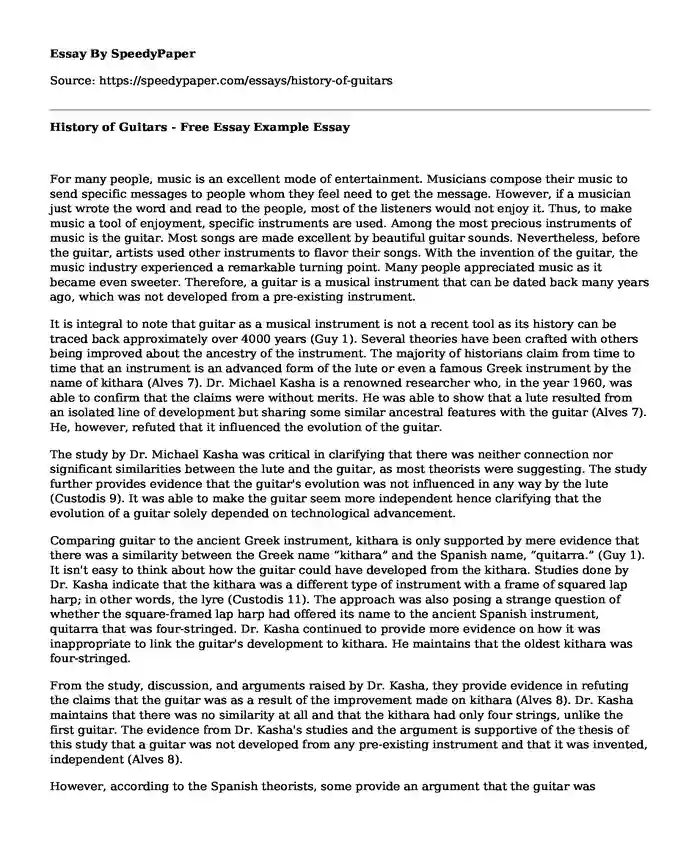
| Essay type: | Cause and effect essays |
| Categories: | Music Culture |
| Pages: | 3 |
| Wordcount: | 768 words |
For many people, music is an excellent mode of entertainment. Musicians compose their music to send specific messages to people whom they feel need to get the message. However, if a musician just wrote the word and read to the people, most of the listeners would not enjoy it. Thus, to make music a tool of enjoyment, specific instruments are used. Among the most precious instruments of music is the guitar. Most songs are made excellent by beautiful guitar sounds. Nevertheless, before the guitar, artists used other instruments to flavor their songs. With the invention of the guitar, the music industry experienced a remarkable turning point. Many people appreciated music as it became even sweeter. Therefore, a guitar is a musical instrument that can be dated back many years ago, which was not developed from a pre-existing instrument.
It is integral to note that guitar as a musical instrument is not a recent tool as its history can be traced back approximately over 4000 years (Guy 1). Several theories have been crafted with others being improved about the ancestry of the instrument. The majority of historians claim from time to time that an instrument is an advanced form of the lute or even a famous Greek instrument by the name of kithara (Alves 7). Dr. Michael Kasha is a renowned researcher who, in the year 1960, was able to confirm that the claims were without merits. He was able to show that a lute resulted from an isolated line of development but sharing some similar ancestral features with the guitar (Alves 7). He, however, refuted that it influenced the evolution of the guitar.
The study by Dr. Michael Kasha was critical in clarifying that there was neither connection nor significant similarities between the lute and the guitar, as most theorists were suggesting. The study further provides evidence that the guitar's evolution was not influenced in any way by the lute (Custodis 9). It was able to make the guitar seem more independent hence clarifying that the evolution of a guitar solely depended on technological advancement.
Comparing guitar to the ancient Greek instrument, kithara is only supported by mere evidence that there was a similarity between the Greek name “kithara” and the Spanish name, “quitarra.” (Guy 1). It isn't easy to think about how the guitar could have developed from the kithara. Studies done by Dr. Kasha indicate that the kithara was a different type of instrument with a frame of squared lap harp; in other words, the lyre (Custodis 11). The approach was also posing a strange question of whether the square-framed lap harp had offered its name to the ancient Spanish instrument, quitarra that was four-stringed. Dr. Kasha continued to provide more evidence on how it was inappropriate to link the guitar's development to kithara. He maintains that the oldest kithara was four-stringed.
From the study, discussion, and arguments raised by Dr. Kasha, they provide evidence in refuting the claims that the guitar was as a result of the improvement made on kithara (Alves 8). Dr. Kasha maintains that there was no similarity at all and that the kithara had only four strings, unlike the first guitar. The evidence from Dr. Kasha's studies and the argument is supportive of the thesis of this study that a guitar was not developed from any pre-existing instrument and that it was invented, independent (Alves 8).
However, according to the Spanish theorists, some provide an argument that the guitar was developed from a Spanish guitar, which was an old Spanish musical instrument. Others use this argument to maintain that kithara was used to develop a guitar as its pronunciation is almost similar to the Spanish guitar.
The arguments made by Dr. Kasha seem to provide more evidence, opposing the belief that a guitar was developed from kithara. Considering the kithara and guitar features, he provides evidence that can distinguish significantly between the features of the kithara and the first guitar.
In conclusion, one may be able to find out that the guitar dates back to many years. The study also shows that several theories were crafted around the guitar and how it came into existence. Nonetheless, Dr. Kasha provides adequate evidence refuting claims that the guitar was developed from kithara. Thus, a guitar is an independent instrument that was not prototyped from kithara as substantial feature differences can be seen.
Works Cited
Alves, Júlio Ribeiro. "The history of the guitar." (2015).
Custodis, Michael. "Living History. The Guitar Virtuoso and Composer Steve Vai." Online-Publication Muenster (2011).Guy, Paul. "A Brief History of the Guitar." Guitar Handbook. http://www. guyguitars. com/eng/handbook/BriefHistory. html (2013).
Cite this page
History of Guitars - Free Essay Example. (2023, Sep 27). Retrieved from https://speedypaper.net/essays/history-of-guitars
Request Removal
If you are the original author of this essay and no longer wish to have it published on the SpeedyPaper website, please click below to request its removal:
- Free Essay on How Business Negotiation Is Against a Multicultural Context
- Essay Example on Power, Race, and Prison Structure in Modern British Prisons
- Essay Sample on Building an Emotionally Intelligent Organization
- Christmas in Italy. Essay Sample
- Essay Sample on Human Activity and Our Drinking Water Supplies
- The Overall Effectiveness of a Coalition - Free Essay
- Transforming Organizational Dynamics: A Journey from Tradition to Learning - Free Paper
Popular categories




